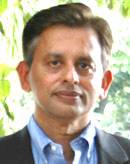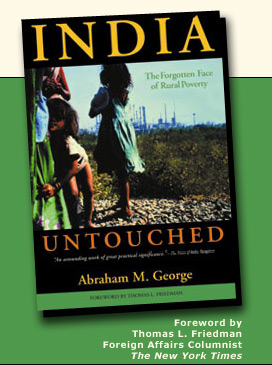SABAS Speaker Series Inaugural Event with Opening Remarks by Dean Cooley
 |
Presented by South Asian Business Association @ Stern (SABAS) and Social Enterprise Association (SEA)
SPEAKER BIO: Abraham George.
Founder, The George Foundation and Chairman, e-MedexOnline LLC.
 Dr. Abraham M. George is the founder and the principal benefactor of The George Foundation. Born in Kerala, India, and trained at the National Defence Academy in Kadakvasla (similar to West Point), he served as an artillery officer in the Indian Army before being honorably discharged as a Captain. Subsequently, he migrated to the U.S. and obtained an M.B.A in Economics, M.S. in Finance, and Ph.D. in International Finance and Banking from the Stern School of Business at New York University.
Dr. Abraham M. George is the founder and the principal benefactor of The George Foundation. Born in Kerala, India, and trained at the National Defence Academy in Kadakvasla (similar to West Point), he served as an artillery officer in the Indian Army before being honorably discharged as a Captain. Subsequently, he migrated to the U.S. and obtained an M.B.A in Economics, M.S. in Finance, and Ph.D. in International Finance and Banking from the Stern School of Business at New York University.
Dr. George is currently the Chairman at eMedexOnline LLC, a medical diagnostic software company in the U.S. His professional career included: Chairman of Multinational Computer Models, Inc. (MCM), a financial software applications company he founded; a Vice Chairman at SunGard Data Systems, a New York Stock Exchange listed company that bought MCM; and a Managing Director at CS First Boston, a global investment bank. Dr. George is currently the dean of the Indian Institute of Journalism & New Media, Bangalore.
Dr. George has written articles and books on a wide range of topics covering finance, environmental protection, political science and sociology. His recently published book, India Untouched: The Forgotten Face of Rural Poverty, has received wide acclaim both in India and abroad.
After over 20 years of absence from India, Dr. George returned in 1995 to start several humanitarian projects through The George Foundation, now one of the largest non-governmental organizations (NGO) in India. His foundation runs innovative projects in poverty alleviation, empowerment of women, education, health care and environment. For information on the charitable projects led by Dr. George, please visit the website of The George Foundation at www.tgfworld.org
ABOUT THE SPEAKER SERIES EVENT:
Dr. Abraham George will speak about wide ranging issues covering the imbalances in the emerging economies, radical measures for poverty eradication and sustainable development.
Come and learn about aspects like why globalization has not reached rural population of many countries. Learn about the importance of assuring strong public governance and providing economic opportunities for all. Learn about strategies that can lead to balanced prosperity and social justice.
Date : Wednesday, April 12, 2006
Time : 4.30 pm Duration: 1 hour
Location: Gardener Commons, Kaufman Management Center, NYU Stern 44 West 4th Street, NYC, NY 10012. Click here for directions.

PROFILE OF THE BOOK: “INDIA UNTOUCHED: THE FORGOTTEN FACE OF RURAL POVERTY”
Get an autographed book of “India Untouched” at the event! All Proceeds from the sale will go to the humanitarian projects run by The George Foundation.
About the book:

In India Untouched, Dr. Abraham George provides a compelling, first-hand account of one man’s struggle against a well-entrenched system to make a difference. He offers fresh insight and incisive analysis into why previous attempts to improve the quality of life in rural India have failed, and what must be done in the future. His book is the story of suffering, cruelty, disease, and illiteracy, of corruption, waste, prejudice, and superstition. It is the story of fifty years of poor governance, and a stunning rebuke to the myth that globalization alone will distribute wealth to where it’s most needed. More importantly, the book is about what can be done to improve the lives of millions of poor people. From www.indiauntouched.com.
India is an interesting place, and a land of extremes. Nestled among the large cities and prosperous transformation is an entire culture of have nots. With an understanding of globalization and public policy, the author dissects the problem of rural poverty in India and advances bold new ideas on how to improve the situation. Illustrated by his own extraordinary personal experience in South India, the author provides lessons which cross national boundaries for those who want to make a difference in the lives of the world's poorest citizens.
Click here to read an excerpt from the book!
Comments:
“The Shanti Bhavan school sits on a once-scorpion-infested bluff about an hour’s drive – and ten centuries – from Bangalore, India’s Silicon Valley. The students are mostly “untouchables” who are not supposed to even get near Indians of a higher caste for fear they will pollute the air others breathe. The school was started by Abraham George, who came back to India with a single mission: to start a privately finance boarding school that would take India’s most deprived children and prove that if you gave them access to the same technologies and education that have enabled other Indians to thrive in globalization, they could too.”
- from India Untouched Foreword by Thomas Friedman, NY Times.
“An astounding work of great significance” - The Times of India, Bangalore.
ABOUT DEAN COOLEY:
Dean Thomas F. Cooley, a noted economist, is the dean of New York University’s Stern School of Business. Dean Cooley is the Paganelli-Bull Professor of Economics, and a professor of economics in the NYU Faculty of Arts and Science. The former President of the Society for Economic Dynamics and a Fellow of the Econometric Society, Dean Cooley has received numerous awards for his teaching and is recognized as a national leader in both macroeconomic theory and business education.
His primary research areas include macroeconomic theory, monetary theory and policy and the financial behavior of firms. His research has been published in numerous journals including The American Economic Review, Journal of Monetary Economics, Review of Economic Dynamics, Journal of Political Economy and Econometrica. He is also the author of Frontiers of Business Cycle Research.
Dean Cooley received his BS from Rensselaer Polytechnic Institute, and his MA and PhD from the University of Pennsylvania. He also holds a doctorem honoris causa from the Stockholm School of Economics.
